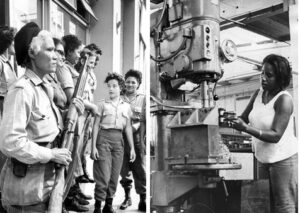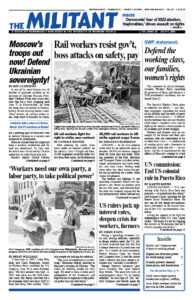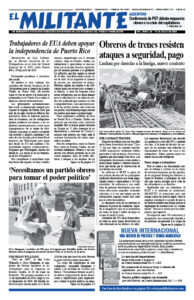
Women and the Cuban Revolution, which includes speeches and documents by Fidel Castro, Vilma Espín and others, is one of Pathfinder’s Books of the Month for July. The excerpt below is from “The Revolution Within the Revolution,” a December 1966 speech by Castro given to the Fifth National Plenary of the Federation of Cuban Women. The book explains women’s changing role in Cuba as workers and farmers took power in 1959. Fidel discusses the gains made in fighting against women’s oppression in Cuba and how “discrimination with respect to race and sex can only be wiped out through a socialist revolution.” Copyright © 1981 by Pathfinder Press. Reprinted by permission.
BY FIDEL CASTRO
This phenomenon of women’s participation in the revolution was a revolution within a revolution. [Applause] And if we were asked what the most revolutionary thing is that the revolution is doing, we would answer that it is precisely this — the revolution that is occurring among the women of our country! [Applause]
If we were asked what things in the revolution have been most instructive for us, we would answer that one of the most interesting lessons for revolutionaries is that being offered by our women. [Applause] …
We are finding that, in reality, this potential force is superior to anything that the most optimistic of us ever dreamed of. We say that perhaps at heart, unconsciously, something of a bias or underestimation existed.
For events are demonstrating, even now, the possibilities of women and the role that women can play in a revolutionary process in which society is liberating itself, above all, from exploitation, and from prejudices and a whole series of circumstances in which women were doubly exploited, doubly humiliated. …
What have we found? What is being found everywhere in this revolutionary program, as far as the Cuban women are concerned? Well, we are finding a whole series of things such as those I mentioned before: a great sense of responsibility, great seriousness, great discipline and enthusiasm. …
[This is] perhaps one of the greatest victories over prejudices that have existed, not for decades or centuries but for thousands of years. We refer to the belief that all a woman could do was wash dishes, wash and iron clothes, cook, keep house, and bear children — [Applause and exclamations] age-old prejudices that placed women in an inferior position in society. In effect, she did not have a productive place in society.
Such prejudices are thousands of years old and have survived through various social systems. If we consider capitalism, women — that is, lower-class women — were doubly exploited or doubly humiliated. A poor woman, part of the working class or of a working-class family, was exploited simply because she was poor, because she was a member of the working class.
But in addition, although she was a woman of the working class, even her own class looked down on and underrated her. Not only was she underestimated, exploited, and looked down upon by the exploiting classes, but even within her own class she was the object of numerous prejudices.
So all these events have been a great lesson to all of us, to every revolutionary. Naturally, a considerable amount of prejudice still persists. If women were to believe that they have totally fulfilled their role as revolutionaries in society, they would be making a mistake. It seems to us that women must still fight and exert great efforts to attain the place that they should really hold in society.
If women in our country were doubly exploited, doubly humiliated in the past, then this simply means that women in a social revolution should be doubly revolutionary. [Applause]
And perhaps this is the explanation, or at least the social basis, for the resolute, enthusiastic, firm, and loyal support given by Cuban women to this revolution.
This revolution has really been two revolutions for women; it has meant a double liberation: as part of the exploited sector of the country, and second, as women, who were discriminated against not only as workers but also as women, in that society of exploitation.
The attitude of Cuban women toward the revolution corresponds to this reality; it corresponds to what the revolution has meant to them.
And the support of the popular masses for the revolution is directly proportional to what the revolution has meant to them in terms of their liberation.
There are two sectors in this country, two sectors of society which, aside from economic reasons, have had other motives for sympathizing and feeling enthusiasm for the revolution. These two sectors are the Black population of Cuba and the female population.
I suppose you recall that in Cuba’s old bourgeois constitution, there was an article which declared illegal any discrimination for reasons of race or sex. The constitution declared such discrimination illegal. But a constitution in a capitalist society, or such an article in a capitalist society, solves nothing, because discrimination for reasons of race and for reasons of sex existed in practice. And the basis for all of this was the existence of a class society which practiced exploitation.
In a class society, which is to say, a society of exploiters and exploited, there was no way of eliminating discrimination for reasons of race or sex. Now the problem of such discrimination has disappeared from our country, because the basis for these two types of discrimination which is, quite simply the exploitation of man by man, has disappeared. [Applause]
Much news reaches us from the United States, for example, about the civil rights struggle of Blacks. Nevertheless, racial discrimination in the United States will not disappear until capitalist society has disappeared.
That is, discrimination will never be wiped out within the framework of capitalist society. Discrimination with respect to race and sex can only be wiped out through a socialist revolution, which eradicates the exploitation of man by man. [Applause]

